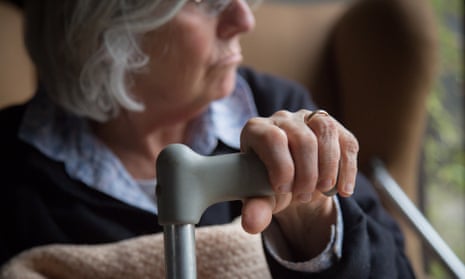The crisis in dementia care reported by the Guardian this week is deeply upsetting. The fact that half of all residential care homes in England inspected this year were rated inadequate or requiring improvement confirms the very worst fears of people and families who place their trust in care services for the most personal and intimate support.
These fears include neglect, abuse and the loss of autonomy and liberty. But many also fear more subtle erosions of dignity, in the form of “everyday” breaches of rights that don’t tend to make the headlines: being dressed in someone else’s clothes, or left without hearing aids or dentures. These seemingly small acts have a huge impact on wellbeing, and can quickly leave people feeling dehumanised. They are the kinds of things we hear on the helpline for our charity – Relatives & Residents Association – which supports older people in care or needing it and their relatives and friends.
A perfect storm has brewed around the care sector in England for decades to create this crisis. Nearly three years of Covid restrictions (still ongoing in care), staff shortages exacerbated by Brexit and the pandemic, and the cost of living crisis have converged to stretch the sector to breaking point. My colleagues running our helpline have worked as advisers on social care for almost 20 years and they have never seen the sector in such a bad state.
The lives of older people and their families are being destroyed by this. Whether you are stuck in hospital waiting for care services, or in a care home without the staff to meet your basic needs, there’s frustration at the lack of urgency to resolve this. Our helpline hears the distress, anxiety, anger and despair from callers. There is nowhere for them to go – with care provision so sparse, they have little or no choice, and feel trapped in a broken system which is stacked heavily against them.
The power imbalance is so skewed that families are too easily dismissed as “expecting too much” or as “problem relatives”. There is little support for people to raise concerns and be taken seriously. When people face visiting bans or eviction notices for raising too many questions or making a complaint, they often become afraid to rock the boat. If the care home simply doesn’t have the staff to improve the situation, families are often left feeling that there is no point in damaging relationships, and so just put up with poor care.
When people do have the courage to complain, resolutions can be short-lived. One recent helpline client developed a serious health issue after being left in their own body waste. This improved after a battle with the manager of the home, only to deteriorate again a few weeks later when the manager’s attention was taken by someone else’s crisis. The cycle of neglect continues.
Callers to our helpline are often shocked by the lack of safeguards to protect their basic rights. “Contact the regulator”, they are told, only to be fobbed off with the Care Quality Commission’s mantra that it doesn’t deal with individual complaints. Then they are told: “Take your complaint to the local government and social care ombudsman.” But this can take months – time that many older people simply don’t have.
Serious concerns can be taken to safeguarding teams, but families can face a heavy evidential burden to be heard. With the government leaving the sector woefully underfunded, families tell us they feel bereft and helpless, especially as so much of this happens behind closed doors. After abandoning the care sector at the outset of the pandemic, the government then swung dramatically to the opposite extreme, and placed the most stringent Covid restrictions on care settings. These have led to closed cultures in too many places, normalising the shutting out of relatives and friends.
Our loved ones are the people who know us best, can help us communicate, and may be the only people we would tell if we were in pain. They are also more likely to spot problems and help to resolve them. Dementia care cannot be good care if it does not recognise the crucial role of relatives and close friends as partners in that care. The government could change this tomorrow by bringing in a legal right to a care supporter across health and care settings. Broader changes are also needed for those who do not have family and friends to speak out for them.
The vital care system has relied on the goodwill and dedication of an underfunded, undersupported, undervalued workforce. For many, this goodwill has run out, and they are leaving the sector. It is unfair to expect care staff to deliver quality services without the training, rewards, qualifications and career development of their NHS colleagues. Supporting people affected by dementia is a skilled profession, yet they are expected to pick this up without proper training and support. A common theme on our helpline is: “The workers are great and trying their hardest, but…”
Yet many care homes can and do provide good dementia care. They are an example of how this can be done, with well supported staff, good leadership and responsiveness to feedback. We must create a care system where everyone can access good care. This requires political will, leadership and resources to reform a sector so vital to the country’s wellbeing. Tomorrow, any one of us could need it.
Helen Wildbore is the director of the Relatives & Residents Association, a charity for older people in or needing care and their relatives and friends
Do you have an opinion on the issues raised in this article? If you would like to submit a response of up to 300 words by email to be considered for publication in our letters section, please click here.










